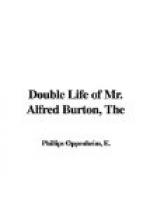“There are too many novels,” he declared.
“I am afraid,” Burton replied, “that there will have to be one more, or else I must starve.”
“Why have you brought it here, anyhow?”
“I thought you might tell me what to do with it,” Burton answered, diffidently.
The sub-editor sighed and drew a sheet of note-paper towards him. He wrote a few lines and put them in an envelope.
“There is a letter of introduction to a publisher,” he explained. “Frankly, I don’t think it is worth the paper it is written on. Nowadays, novels are published or not, either according to their merit or the possibility of their appealing to the public taste.”
Burton looked at the address.
“Thank you very much,” he said. “I will take this in myself.”
“When are you going to bring us something?” the sub-editor inquired.
“I am going home to try and write something now,” Burton replied. “It is either that or the pawnshop.”
The sub-editor nodded.
“Novels are all very well for amusement,” he said, “but they don’t bring in bread and cheese. Come right up to me as soon as you’ve got something.”
Burton left his novel at the address which the sub-editor had given him, and went back to his lodgings. He let himself in with a latchkey. The caretaker of the floor bustled up to him as he turned towards the door of his room.
“Don’t know that I’ve done right, sir,” she remarked, doubtfully. “There was a young person here, waiting about to see you, been waiting the best part of an hour. I let her into your sitting-room.”
“Any name?” Burton asked.
The caretaker looked thoughtfully up at the ceiling.
“Said she was your wife, sir. Sorry if I’ve done wrong. It came over me afterwards that I’d been a bit rash.”
Burton threw open the door of his sitting-room and closed it quickly behind him. It was indeed Ellen who was sitting in the most uncomfortable chair, with her arms folded, in an attitude of grim but patient resignation. She was still wearing the hat with the wing, the mauve scarf, the tan shoes, and the velveteen gown. A touch of the Parisienne, however, was supplied to her costume by a black veil dotted over with purple spots. Her taste in perfumes was obviously unaltered.
“Ellen!” he exclaimed.
“Well?” she replied.
As a monosyllabic start to a conversation, Ellen’s “Well?” created difficulties. Instead of his demanding an explanation, she was doing it. Burton was conscious that his opening was not brilliant.
“Why, this is quite a surprise!” he said. “I had no idea you were here.”
“Dare say not,” she answered. “Didn’t know I was coming myself till I found myself on the doorstep. Kind of impulse, I suppose. What have you been doing to little Alf?”
Burton looked at her in bewilderment.
“Doing to the boy?” he repeated. “I haven’t seen him since I saw you last.”




